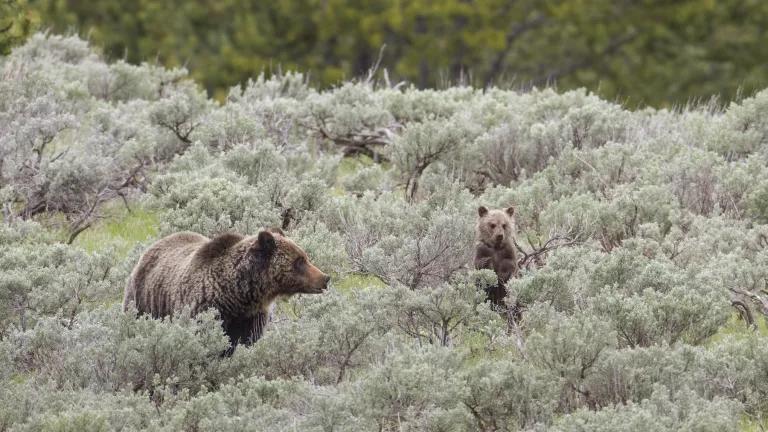
The International Union for the Conservation of Nature today released the online voting results for its 2016 World Conservation Congress. More than 10,000 delegates from all over the world – including policy experts, scientists, government officials and more – head to Hawaii this week to discuss solutions to the world’s most pressing environmental and development challenges, including issues resolved in the online voting, as well as resolutions that will be debated at the Congress.
The world’s largest conservation event begins tomorrow in Honolulu and is being held in the U.S. for the first time in its 60-year history.
There are about 100 total motions addressing issues ranging from imperiled species to national parks. However, NRDC is focused on motions related to protections for elephants, pangolins, vaquita, sharks and rays, whales, Bristol Bay, and oceans.
Pangolins (Motion 11)
“The number of pangolins being slaughtered for their meat and scales is sickening,” said Elly Pepper, deputy director of NRDC’s wildlife trade initiative. “These animals aren’t a delicacy or a medicine; they are living, breathing creatures that won’t be around much longer if we don’t do something soon. It’s critical that the conservation world – and delegates at CITES – increase protections for all eight species of pangolins if we want to ensure their survival.”
Fact sheet: Pangolins in Peril: A Vanishing Species
Vaquita (Motion 13)
“While there are fewer than 60 vaquita left, there is still time for the species to recover and thrive,” said Zak Smith, director of NRDC’s wildlife trade initiative. “Today’s vote shows the conservation community standing with the vaquita on a path to recovery instead of the road to extinction. We can create the conditions necessary for vaquita recovery and this vote is a step in the right direction.”
Expert blog: And Then There Were 60: The Vaquita Porpoise's Slide to Extinction
Sharks and rays (Motion 23)
“IUCN members made a strong statement today about the importance of protecting sharks and rays on a global scale,” said Elizabeth Murdock, director of NRDC’s Pacific Ocean Initiative. “These animals are critical to ocean health, but are extremely vulnerable to exploitation. In fact, IUCN estimates that roughly one-quarter of shark species worldwide are threatened with extinction.
“Today’s action targets two of the most important ways we can protect sharks globally: First, we can reduce the pressure on silky sharks, thresher sharks and mobula rays by regulating trade in these extremely vulnerable species, which is driven by unsustainable demand for their fins and gill plates. Second, we can ensure the health of their populations worldwide by calling on nations and regional fisheries management organizations to develop science-based management measures to reduce unsustainable fishing pressure and guard against illegal, unreported and unregulated (IUU) fishing of these species.”
Expert blog: IUCN Votes to Increase Protections for Sharks & Rays
Antarctica and the Southern Ocean (Motion 31)
“All around the globe, our oceans are in trouble,” said Elizabeth Murdock, director of NRDC’s Pacific Ocean Initiative. “They’re threatened by overfishing, climate change and ocean acidification. Marine protected areas are one of the most effective ways to protect ocean habitats and biodiversity.
“Today, the IUCN sent a strong message about the importance of designating protected areas in the Antarctic — both on land and in the ocean. By adopting this motion, IUCN members recognize IUCN’s own critical role in helping to create representative protected area systems in the Antarctic by working with the Antarctic governance system to achieve this goal, and thus increase protection for the fragile Antarctic environment.”
Bristol Bay / Pebble Mine (Motion 57)
“With the definitive action today by the World Conservation Congress, the momentum to stop the uniquely dangerous Pebble Mine continues to grow,” said NRDC Western Director Joel Reynolds. “The people of Bristol Bay oppose it, the people of Alaska oppose it, and now the world’s leading conservation experts have endorsed that opposition. The reckless Pebble Mine is a recipe for catastrophic contamination of the world’s greatest wild salmon fishery, and today’s action reflects an international scientific consensus that it must be stopped.”
Expert blog: Earth to Pebble Mine: Stay Away From Bristol Bay
Whales (Motion 58)
“The decisive action today by the World Conservation Congress is a win for the whales,” said Taryn Kiekow Heimer, senior policy analyst with NRDC’s Marine Mammal Protection Project. “It harpoons Japan’s ‘scientific research’ whaling program and recognizes that there is no legitimate reason to kill thousands of whales to study them.
“The IUCN is the latest international body to take a stand in defense of whales. A 2014 ruling by the International Court of Justice found that Japan’s ‘scientific research’ whaling program in the Antarctic was not scientific in nature and ordered Japan to stop. In 2015, the Scientific Committee of the International Whaling Commission – the world’s foremost experts on whales – concluded that Japan’s whaling program was not scientifically justified. Yet Japan killed another 333 minke whales last season, including 200 pregnant females.
“The world has spoken and the message is clear: stop killing whales.”
Expert blog: World to Japan: Stop Killing Whales




